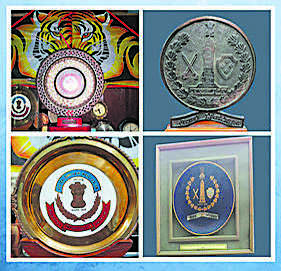Of striking encounters and engaging stories
Maninder Singh
Governor of Punjab VP Singh Badnore recently released Rajendra Shekhar’s autobiographical account Memories Are Made Of This. The memoir follows upon a long line of autobiographical works by police officers such as SK Datta, who wrote Top Cop Recalls. Without Fear or Favour was penned by Joginder Singh. KPS Gill wrote The Punjab Story while Kiran Bedi authored I Dare. Long ago, Nari Rustomjee of the ICS wrote about India’s enchanted far-flung frontiers.
This book is an endearing account, written with honesty, about the life and times of an officer of great integrity. It is a stirring story, which entertains and informs. I know the pleasure that I experienced on reading through this memoir. Unlike many ungenerous men, Shekhar has such good words to speak about his wife. He writes, “Sheila enriched my roving vision with her breathtaking appearance”. There are nuggets aplenty. Did we know that there was a Collector of Chittor, with the unexpected name of Alauddin Khilji. Or that even in independent India, Lord Dalhousie’s infamous Doctrine of Lapse continued to operate. When the last Nawab of Tonk died without leaving a legitimate heir, the payments from the privy purse were discontinued with.
The Baretha tiger hunt
There are striking encounters with the public figures of the time, such as Mahatma Gandhi during a prayer meeting at Birla House. The day happened to be, unfortunately for the author as a teenaged boy, to be the great man’s day of silence. As a probationer of the 1957 batch, the author met with India’s first Prime Minister in South Block. It was an encounter that left a vivid impression. The author has written lovingly about his father’s younger brother, a laidback man, who completely subscribed to the sentiment that “the time you enjoy wasting is not wasted time.”
There is an engaging description of the Bharatpur state, where Shekhar’s dad was the Huzoor Secretary to the ruler. This was an appellation coined and conjured by the ruler himself. The account of the Baretha tiger hunt and how its unexpected consequences resulted in the author’s dispatch to Mayo College, the Eton of the East, makes for compelling reading. His mother, though, entertained grave doubts about Mayo’s ability to provide a nutritious diet to her son.
In these pages, there is much to learn about the nuances of the services, the relations between the Collector and the SP in a district, the perils and pleasures of administration. The club house of Tonk, where the author defeated the great Masoom Ali in an epic game of lawn tennis, was no longer the hive of convivial sports and get-togethers among district officials. Shekhar writes of the ill-tempered treasury officer of Tonk in those days, one Fatte Lal, with great aplomb.
Days in the CBI
From his days in the CBI, the author writes of the LN Mishra case of 1975, the Nirankari Baba murder in 1980 and General Vaidya’s killing in 1986, where the vital clue which cracked the case was the hand-written registration number of a car on the last page of a Ken Follet novel called Triple.
The author recalls the twist that the life of Dinesh MN, a one-time SP of Udaipur, took when he was imprisoned for seven years on the charge of a false encounter in the Sohrabuddin case. He was acquitted in 2017. How galling it must be to the spirit of a police officer to mark time behind bars. In an interview, Dinesh talked about how he found the inspiration to endure those years in a book called Man’s Search for Meaning by Victor Frankl, an Auschwitz survivor.
In his Presidential remarks, the Governor recalled his days at Mayo College with great fondness. He narrated how, while he was an MLA in 1977, and Shekhar was the Rajasthan DGP, he needed to have an unpopular SHO transferred. The Governor said he had put forward his request to the DGP with trepidation. The DGP assured he would have the errant SHO transferred, but the choice of the officer who would replace him would have to be left to him.
If an honest man is the noblest work of God, as Alexander Pope averred in his An Essay on Man, Shekhar appears to qualify for the honour. After superannuation, he suffered a horrific accident in Muscat. I do feel that it was the author’s good deeds that may have stood him in good stead.










